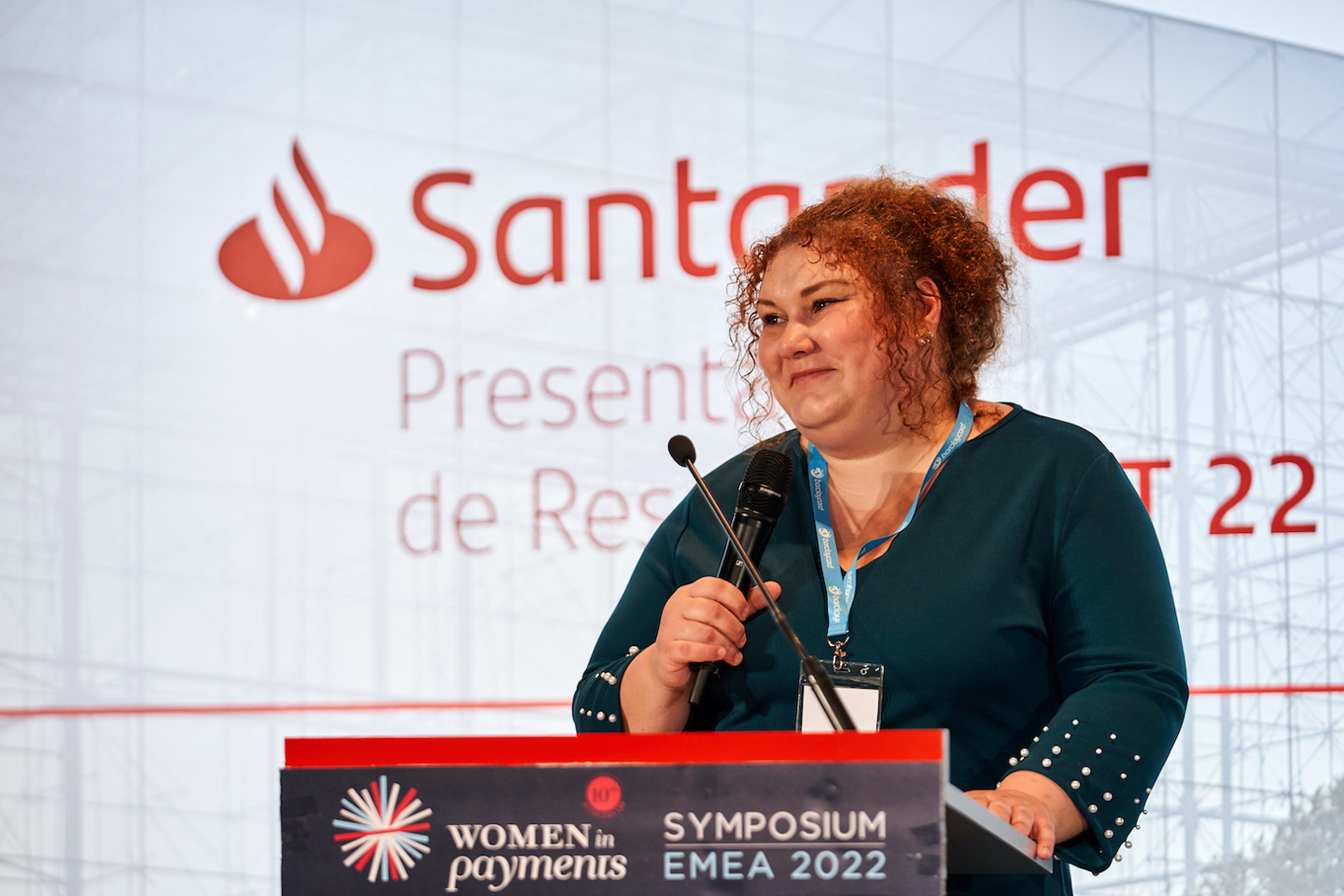The Amrop Digital Interviews: Gabriela Nguyen-Groza, Luxembourg
The boards of payment companies remain largely dominated by men. Gabriela Nguyen-Groza, Managing Partner in Luxembourg and senior advisor to the EMEA board of Women in Payments, believes women must have a clear sense of their added value for a board, alongside an effective strategy to find the right mandates.
We spoke to her on the sidelines of her keynote speech at the Women in Payments 2022 Symposium in Madrid.

Dare to Succeed!
Q: What was the theme of your speech during the event?
A: Women in Payments is a global organization, a supportive and empowering community for women in the payments industry. While women are fairly well-represented at the C-level, there is still a gap at the Board level, with only 23% of women on the boards of payment companies. During my keynote, I gave participants insights into what Boards are looking for to fill Independent Director positions in terms of tangible and intangible skills. Also, I talked about how to develop an effective strategy to look for the right Board positions and how to identify their Added Value as Independent Directors, and develop a unique and clear Value Proposition based on their expertise and soft skills.
Q: One of the questions asked during the executive panel you were part of was about the tools or support mechanisms that have helped you through your career?
A: My main tool is always “stealing wisdom” from whomever I can. One of my first mentors once told me that I do not have an ego. At first, I did not know how to take it, but he explained that he meant it as a compliment. Having no ego allows you to continuously learn, recognize when you don’t know something, and be able to ask for help. So that’s my secret – I’m stealing wisdom from everyone, everywhere! (laughs) I have several mentors, three of them at Amrop actually, and I’m always trying to surround myself with people who challenge me and help me grow. For me, it’s crucial to feel that I am learning something every day, that I am continuously growing and becoming a better version of myself professionally. It is the same with candidates. Salary is not the first reason people change jobs. The project, the members of the team, the intellectual and professional challenge, and the chance to grow professionally is the main factor. We learn from people, we grow surrounded by people. People do not change jobs for jobs, but for people.
Q: What words of advice do you have to the women in the payment industry, based on your personal experience and career development?
A: You will laugh. (laughs) I am at war with “The Shitty Committee”. The shitty committee is a constant companion of many women (and some men). It’s that inner voice that shouts in their mind that they do not belong, that they are just not good enough. It is that inner loud voice that sabotages their thoughts or actions with self-doubt and keeps them from reaching their full potential. As an executive search professional, I get to see this even with women at the executive level – brilliant women with a proven track record of success.
I grew up in communist Romania, under the dictatorship of Ceausescu. Life was very tough back then, but there is one thing that deeply inspired me. When it comes to work, there is no difference between women and men. Culturally, women do not have any barriers in their professional life in Romania. To think that you cannot succeed professionally because you are a woman is purely unthinkable. I was lucky enough to be born in a society where there were no barriers for women. My upbringing and my conscience gave me the fundamental conviction that if I work hard, I will succeed. I don’t consider myself a woman when I work – I am a professional.
Leadership is not about gender, it is about having no limits in your mind. Leadership is daring to succeed!

Q: And yet the event was about the role of women in the industry in particular.
A: Sure, but the event was inclusive. Men attended too. It was an event for women and men, made by women and men. The goal is not to segregate, but to work together successfully and bridge the gaps.
Q: Was there anything you heard from other panelists that stood out for you and which you’d like to take away from the event?
A: One very interesting idea, which is especially relevant in tech and digital industries, is the concept of “reverse mentoring”. Mentoring is a relationship between somebody more experienced and somebody less experienced, where the senior helps the less experienced to develop. Reverse mentoring is a practice where the more senior employee seeks to gain insights from the less experienced, often younger professional. I find it highly beneficial because it keeps one updated and in the loop with what the younger generations are thinking. I believe that the fast-paced development of tech and digital fields renders practices such as this truly crucial – one cannot allow oneself and the organization to become isolated from the younger generation.
Q: Let’s talk about the industry for a moment. COVID-19 pandemic has changed the landscape and accelerated the digital revolution: how has the payments industry been affected, and changed, as we emerge from the pandemic?
A: Significant changes have taken place, from both the organization's and the candidate’s perspectives. Being based in Luxembourg, a small and very international country, I’ve never done a local search: for every search, I must go into at least four countries – Luxembourg, France, Belgium, and Germany; most of the time also the UK. So, I’ve always been working with what I call the “global candidate”. COVID has suddenly brought this kind of professional into the light. The “global candidates” are professionals who can work from anywhere in the world, completely or partially remote, who are quite mobile geographically, who have lived in several countries, and who speak several languages. They have a very open-minded, global, and inclusive mindset. For this type of candidate, geography became irrelevant. They don’t have boundaries in their minds and they can bring high added value to companies. Of course, these people existed before COVID, but the pandemic suddenly put the spotlight on them. Also, their number increased, as people realized that we do not need to physically link with a company to bring added value.
When it comes to the payment industry, the COVID-19 years have, of course, been very profitable and very busy; the e-commerce increased dramatically and the payments, as a result, increased dramatically too. So, these have been good years, and the business is still on the rise even as the pandemic itself recedes. The same goes for the global candidates – they are here to stay.
Q: You already mentioned the potential obstacles female executives might be facing in the payments industry. What would be the ways of increasing their participation, and their numbers on boards of the payment companies?
A: Women are fairly well represented in the leadership positions in the payment companies, but very much underrepresented on boards. I believe that the first step in the right direction is for women to dare to consider it as an option – to dare to think about it! A lot of people believe that becoming a member of a board, for an independent director, is something that only people over 60, who are retiring and looking for alternative ways to have income, do. But this doesn’t need to be the case at all – you can start in your 40ies, 30ies, or even 20ies!
So, women need to think about it, dare to act on it, and discover and formulate the added value they can bring to the board. Female leadership is a two-way street. Promoting female leadership is a two-way street. It needs a lot of willingness from companies. In that respect, a lot has happened in western Europe over the past years.
But women also must take their careers into their own hands: know what they want and especially what they don’t want. Set up a career plan and go for it! So finally, that shitty committee shuts up. And women dare to succeed!
